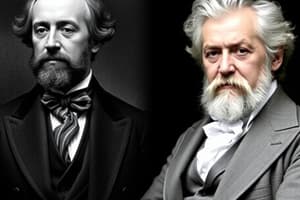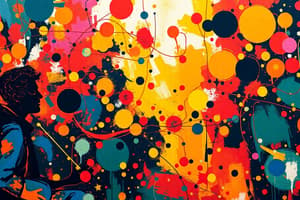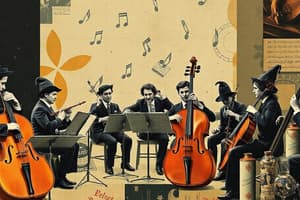Podcast
Questions and Answers
What unique technique do violins use in Berlioz's 'Dream of a Witches' Sabbath' to convey terror?
What unique technique do violins use in Berlioz's 'Dream of a Witches' Sabbath' to convey terror?
- With the bow (correct)
- Pizzicato
- Sul ponticello
- Col legno
Which instrument is NOT mentioned as playing a significant role in 'March to the Scaffold'?
Which instrument is NOT mentioned as playing a significant role in 'March to the Scaffold'?
- Violins (correct)
- Horns
- Clarinet
- Timpani
What effect do tubular bells aim to create in 'Dream of a Witches' Sabbath'?
What effect do tubular bells aim to create in 'Dream of a Witches' Sabbath'?
- A dreamy effect
- A funeral bell toll (correct)
- A rhythmic accent
- A melody line
Which instrument combination suggests offstage shepherds in 'Scene in the Country'?
Which instrument combination suggests offstage shepherds in 'Scene in the Country'?
Which movement from Berlioz's compositions features a depiction of a thunderstorm?
Which movement from Berlioz's compositions features a depiction of a thunderstorm?
Who revised Berlioz's treatise on instrumentation to include modern instruments?
Who revised Berlioz's treatise on instrumentation to include modern instruments?
What role does the clarinet play in 'March to the Scaffold'?
What role does the clarinet play in 'March to the Scaffold'?
What was significant about Berlioz's understanding of orchestral instrumentation?
What was significant about Berlioz's understanding of orchestral instrumentation?
Which instrument is used to suggest offstage effects or environmental sounds in Berlioz's compositions?
Which instrument is used to suggest offstage effects or environmental sounds in Berlioz's compositions?
In what year was Berlioz's treatise on instrumentation first published?
In what year was Berlioz's treatise on instrumentation first published?
Flashcards
Hector Berlioz
Hector Berlioz
A self-taught composer known for innovative orchestration.
Treatise on Instrumentation
Treatise on Instrumentation
Berlioz's work detailing the role of each instrument in an orchestra.
Movement 3: Scene in the Country
Movement 3: Scene in the Country
Features cor anglais and oboe mimicking offstage shepherds.
Movement 4: March to the Scaffold
Movement 4: March to the Scaffold
Signup and view all the flashcards
Movement 5: Dream of a Witches' Sabbath
Movement 5: Dream of a Witches' Sabbath
Signup and view all the flashcards
Violins
Violins
Signup and view all the flashcards
Tubular Bells
Tubular Bells
Signup and view all the flashcards
Cor Anglais
Cor Anglais
Signup and view all the flashcards
Timpani
Timpani
Signup and view all the flashcards
Clarinet
Clarinet
Signup and view all the flashcards
Study Notes
Hector Berlioz's Orchestration
- Berlioz was self-taught in music, studying works by other composers intuitively.
- He understood how instruments could be combined.
- He wrote about the range and quality of instruments in his Treatise on Instrumentation (1844).
- This work was revised by Richard Strauss in 1904 to include more modern instruments.
- Berlioz's orchestration explored the role of each instrument within the orchestra.
Orchestration Examples in Berlioz's Works
- Movement 3: Scene in the Country: Cor anglais and oboe convey shepherds' dialogue offstage.
- Movement 4: March to the Scaffold: Timpani and horns accompany a march; solo clarinet plays the artist's final thoughts, interrupted by a chord from the orchestra as the guillotine blade falls.
- Movement 5: Dream of Witches' Sabbath: Violins produce an eerie effect using bow wood; tubular bells represent a funeral bell.
Studying That Suits You
Use AI to generate personalized quizzes and flashcards to suit your learning preferences.




